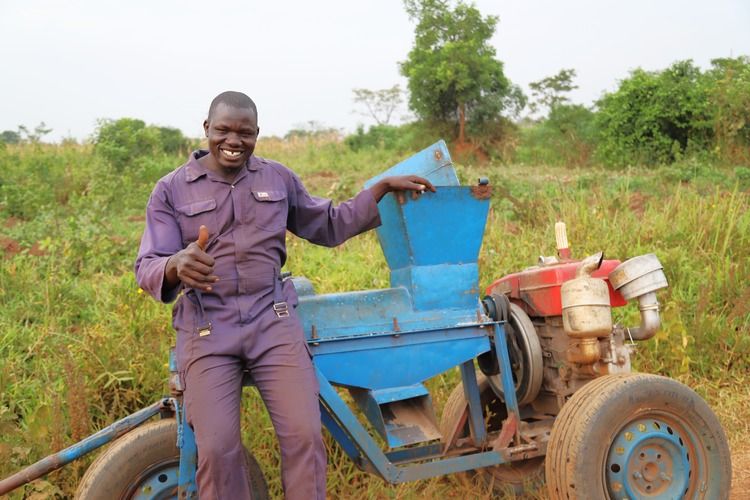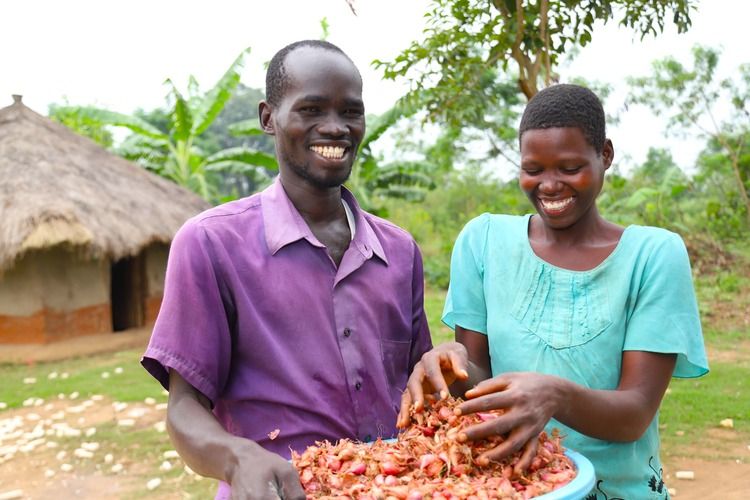 Stories
Stories
May 24, 2024 • 5 min read
GOAL is partnering with the Mastercard Foundation to help 300,000 young Ugandans access dignified and fulfilling work in the agricultural sector. The 2nd Annual Markets for Youth Learning Conference will take place on the 6th & 7th December in Kampala, Uganda.
Benson’s Story
Benson is 34 years old and lives in Abulumoyo Village in Apac District, Northern Uganda. Before Benson became involved with the Markets for Youth programme, he was a member of Abulumoyo Youth Farmers’ Group. One of GOAL’s local implementation partners, Wezesha Impact, approached the group. They provided the youth with financial literacy, agronomic, and business development training. They also introduced the young farmers to a variety of agro-businesses. Those companies then sold the youth seeds at discounted prices and instructed them on how to plant them.
Their demo garden yielded 700 kilograms of maize valued at 2.5 million Ugandan shillings (approximately €602). The following season, the youths generated over 15 million Ugandan shillings (approximately €3,615) through maize farming alone.
The strategic partnership with companies like AgriFarm, BRAC, and Ag-Plotous opened the door to accessing superior seeds, fertilisers, and insecticides at discounted rates. This revolutionised their farming practices. The group discovered new avenues to market their produce. With guidance from UFAAS, they were even able to sell their produce outside Uganda.
Recently, Benson sold 650 kilograms of maize seeds at an agricultural expo in Apac. He raked in a total of 5,750,000 Ugandan shillings (approximately €1,385). From this, he made a profit of 2 million Ugandan shillings (approximately €482).
Benson’s farm has evolved into a thriving enterprise. Benson is now an educator who trains other youth in the art of agronomic entrepreneurship. Benson has also united eleven farming groups in Uganda under the banner of the ‘Rural Producers Organisation.’ This coalition has been very successful so far, and Benson’s story is a testament to the power of resilience, partnership, and hard work.

Richard’s Story
Richard is 28 years old and lives in Kitgum District, Northern Uganda. Richard is disabled and used to farm only a small number of crops for home consumption. He also owned ten beehives to supplement his income. Richard didn’t feel that he was an active participant in his community and felt isolated from his peers. Then, a Markets for Youth champion invited him to join a local youth group called Yepa Piggery VSLA. The group received training on all elements of building resilient agricultural livelihoods, including business development, VSLA management, and agronomic practices.
“After these trainings, I gained the courage and confidence to increase the number of bee hives I owned from 10 to 35. The Youth Champion told me that there is a good market for honey. He also connected me to a company called the Agro-Tourism Association (ATA). I started using high-quality seeds and planted them on two acres of land. They are now at the flowering stage,” he says proudly.
Charles, the Youth Champion, added: “Richard is an early adopter who changed his mindset and started farming as a business. He went through a successful transformation, from being isolated and with little self-confidence to a young, confident and successful farmer who will soon showcase his products in an upcoming exhibition organised by ATA.”

Aaron’s Story
Aaron is 26 years old and lives in Baroolam Village in Dokolo District, Northern Uganda. “I started engaging with the Markets for Youth programme through a cooperative,” he explains. “A coordinator of Ag-Ploutos, an agricultural firm whose core business is to strengthen food supply chains, explained to us that there is an opportunity for youth like us to join a programme on agribusiness development. Most of us signed up, some for beekeeping, some for poultry and most of us for crops. And so I did as well!”
Aaron received training on good farming practices and quality seeds at discounted prices and now cultivates a two-acre maize farm. “In the first year, I produced eight sacks of maize, giving me almost one million Uganda shillings (approximately €241)! An amount I had never held in my hands before!” Aaron used the money to expand his farm and rented two additional gardens. He also bought a goat and even had money left over to purchase some household items.
In the following season, earned enough money from his yields to transition from renting land to owning his own gardens. He now owns three acres of land and has joined his local VSLA. He is planning to open a small shop at a nearby trading centre to sell general merchandise, offer mobile money services, and store his harvests.
Aaron’s advice on building resilient agricultural livelihoods is: “Be a part of a group so that it helps you acquire new knowledge and overcome challenges. Doing it alone brings you nowhere. Nevertheless, you must do it yourself by working hard. I have shown that it will bear fruit.”

About Markets for Youth
Uganda has one of the youngest populations in the world. More than 75% of the population is below the age of 30. The country has one of the highest youth unemployment rates in Sub-Saharan Africa at 13.3%. With employment opportunities limited, finding work and a pathway out of poverty is a huge challenge. Young Africa Works in Uganda is focused on finding solutions to the youth employment challenge using a market system approach, by building resilient agricultural livelihoods for young people.
GOAL is partnering with the Mastercard Foundation to help 300,000 young Ugandans access dignified and fulfilling employment in the agricultural sector. The programme is also empowering 70,000 women, 30,000 refugees, and 15,000 people living with disabilities to start sustainable, resilient agri-businesses.
Private sector partnerships and civil society are playing a huge role in the implementation of the programme. The cornerstone of the initiative is adaptive management with an emphasis on evidence-based learning, open communication and optimising the use of technology. Learn more about the Markets for Youth programme.

